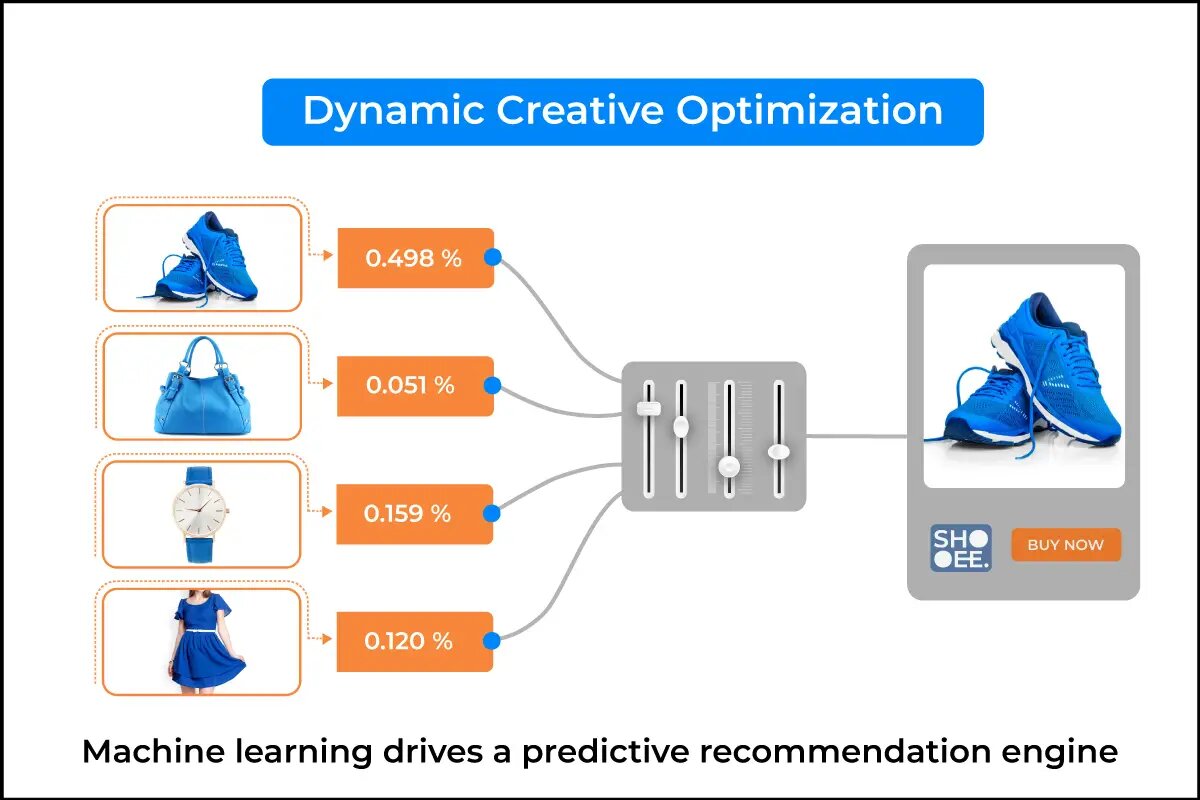One thing digital marketers can’t stand is underperforming ads. And we’ve all been there. Sometimes it could be because your bidding isn’t competitive enough to get sufficient impression volume, or your audience targeting is missing the mark. But oftentimes, it’s the ad asset itself that isn’t breaking through and engaging your audience.
Creative optimization is also one of the more challenging aspects of being a digital marketer. You often need to painstakingly create many versions of an ad, and run numerous tests to understand what works for each of your audience segments. However, A/B testing at scale is not only time-consuming, but it’s also expensive.
So how do digital marketers run statistically significant tests to deliver engaging ad experiences? One of the top tools marketers use to improve the relevance and performance of ads is Dynamic Creative Optimization.
What is Dynamic Creative Optimization?
Dynamic Creative Optimization or DCO uses machine learning to analyze various combinations of ad assets to pick the right headline, CTA, and image for the right audience. Taking into account the different user targeting variables like device, location, and previous app interactions, Dynamic Creative Optimization runs multivariate testing and allocates your spending to the top-performing combination. The decision is made in real-time, which gives it an edge over manual optimization.
How does DCO Work?
Driven by Deep Learning, DCO utilizes user data points and profiled devices to run continuous A/B testing. It automates the optimization of your creatives by tracking ad performance, such as the Click-Through Rate and Conversion Rates, and other ad engagement metrics to ensure relevance. It’s a win-win because users get a more personalized ad experience and marketers benefit from higher ad engagement.
Imagine your ad space is simply a blank canvas. When a user is about to view the ad space, DCO processes various algorithms to understand that user’s intent and behavior based on recent brand interactions, purchase frequency, recency, and more. Accordingly, a visual, messaging and a call to action are combined on the spot and displayed to the user.

As DCO relies on data sets, the following are key to its performance:
- Rich Events: Used to identify or tag the user intent by capturing app postbacks or web engagement, such as products viewed, funnel stages, affluence, and other user engagement signals in the app.
- Advertiser’s Catalog: A feed of information from the advertiser like inventory status, discount, metadata, and more.
- Data Management Platform: Data Management Platform (DMP) collects and manages the data to users to build audience sets and contexts for online advertising campaigns.
Now, algorithms in the ad engine process these data sets to build relevant and contextual ad experiences for each user.
Thereby, DCO can improve your ad performance by fine-tuning:
- The ad design for each device.
- The context of the user history
- The stage of the purchase funnel
By tracking CTR/CVR performance for each creative carefully and automating A/B testing, you’re able to drive better results. All this is operating in real-time to generate custom recommendations for individual users and everything managed by Deep-Learning with almost zero human interaction.
Visualizing Your Creative Performance
The marketer can also learn a lot about what resonates with their different audience segments by analyzing the results of campaigns running with Dynamic Creative Optimization. You can gather insights like which colors draw more attention, and which products or offers inspire action.
With Singular’s Creative Analytics you can go a step further. First, the reporting is visual, so you can see the ad asset, whether it be an image or video, side-by-side with its performance metrics.
For a bonus, Creative Clustering automatically groups visually similar ads, like those run with DCO, for easy analysis of creative themes across campaigns and media sources.
A Popular Use Case of DCO: Recommending Top-Selling Products
A common challenge in marketing is users dropping off after checking a product, in some verticals referred to as cart abandons. So marketers rely on retargeting ads to reduce the drop-off rate, which could be supported further by the utilization of DCO. It can lower your drop-off rate by recommending top-selling products in the category in which the user has shown interest.
By collecting the in-app engagement postbacks, the ad engine can determine the product, category, subcategory, and funnel stage of the user who dropped off without completing the purchase. The ad engine figures out the top-selling product for those parameters and automatically serves that in the dynamic creative ads. Targeting users with dynamic ads turns out to be more relevant and triggers the customer’s intent to drive better conversions.
Does DCO Take Away Advertiser’s Control over Creatives?
DCO helps you utilize creatives in a more result-oriented way. Building the right creative is one of the key levers of campaign optimization, where its quality, sequence, and fatigue possibilities can be concerns of the advertisers. While DCO can automate the process of choosing the creative for a user, you need to provide creative templates in alignment with brand guidelines. To simplify the process of defining creative templates in DCO, some ad platforms offer dashboards (like CTools) where you can:
- Easily track all ad creatives within a single interface
- Share the creatives with the team and clients for review and approval
- Track the performance of each creative
- Automate and manually run A/B testing
Want to see how RevX Dynamic Creative Optimization and Smart Targeting can boost your ad performance?
Connect with us at RevX.io.


